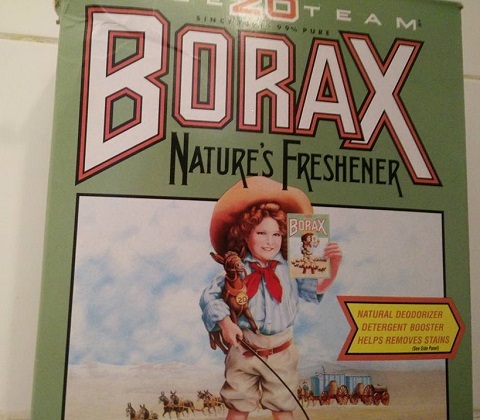How safe is borax?

You can clean without borax. Try my borax-free green cleaning recipes! (Credit: Lindsay Coulter)
Borax, or sodium borate, is an alkaline mineral salt. It's a naturally occurring element. But "natural" doesn't mean "harmless." Consider asbestos or mercury.
A brief history of borax
Before 2000, borax was a common household item. It was a popular, effective cleaning product. It disinfects, whitens and fights mold and mildew. It also kills ants (used as a low-risk pesticide).
Many DIY cleaning recipes featured borax as an eco-friendlier option to petroleum-based ingredients in conventional cleaning products.
In 2008, the European Union (PDF) classified boric acid and borax as reproductive toxins. But it said consumer exposure to low doses of borates in cleaning products--soaps and detergents--is 'negligible.'
Confused? Me, too. So I called another "green living" expert, Adria Vasil of Echololic, who was also researching the safety of borax (and, like me, had a box collecting dust). She tried to untangle the borax mess in 2014:
"A few years ago, the European Union (PDF) said boric acid/borax were reproductive toxins at high levels but not endocrine disruptors (which can trigger problems at quite low levels). At that point, they issued another report (PDF) assessing the actual risk to consumers and they said levels used in detergents/soaps/cleaning products were safe. Then things shifted. They ended up putting boric acid on the list of potential hormone disruptors. I think it's important to clarify that the list basically prioritizes substances for further research for endocrine disrupting effects. The list contains some seriously troublesome chems, like known toxin PCB, as well as BPA, on which hundreds of studies have found hormone disrupting effects. Boric acid doesn't have the same lengthy rap sheet in terms of hormone disruption. So a lot of people are confused. Should we should keep using it with abandon? Should we shelve it for good? Well, I think we should certainly pause and wait for more research. It's also unclear why the EU only put boric acid on the list and not borax, when they've lumped the two together before. However, they are chemically different. So we'll assume borax was intentionally left off the list and is of less concern to consumers then boric acid, at these quantities."
In 2016, Health Canada did a screening assessment of boric acid: "The Government of Canada is proposing that boric acid, its salts and its precursors may be considered harmful to human health at current levels of exposure."
What's "exposure"?
Through food (such as fruits and vegetables) and drinking water. But "Natural sources of boric acid in food (for example, fruits and vegetables) are not considered to be a health risk."
Through common consumer products such as pesticides, cleaning products, cosmetics, drugs, natural health products, and swimming pool and spa products.
From DIY arts and crafts and toys made with boric acid.
What now?
Clean without borax. Try my borax-free recipes for laundry soap, dish soap and toilet bowl cleaner (all purpose powder recipe).
Make borax-free cosmetics for baby, body and hair.
Make dough and goop (a.k.a. ooblek) for children out of food-grade ingredients.
For ants, try diatomaceous earth
Not ready to let go? Stay tuned! Next week's blog is about borax substitutes in green cleaning recipes. Sign up for my digest so you don't miss it.
Sincerely,
Lindsay Coulter, a fellow Queen of Green
Hey! Want more DSF? Join David Suzuki on Facebook

David Suzuki's Blog
- David Suzuki's profile
- 248 followers



